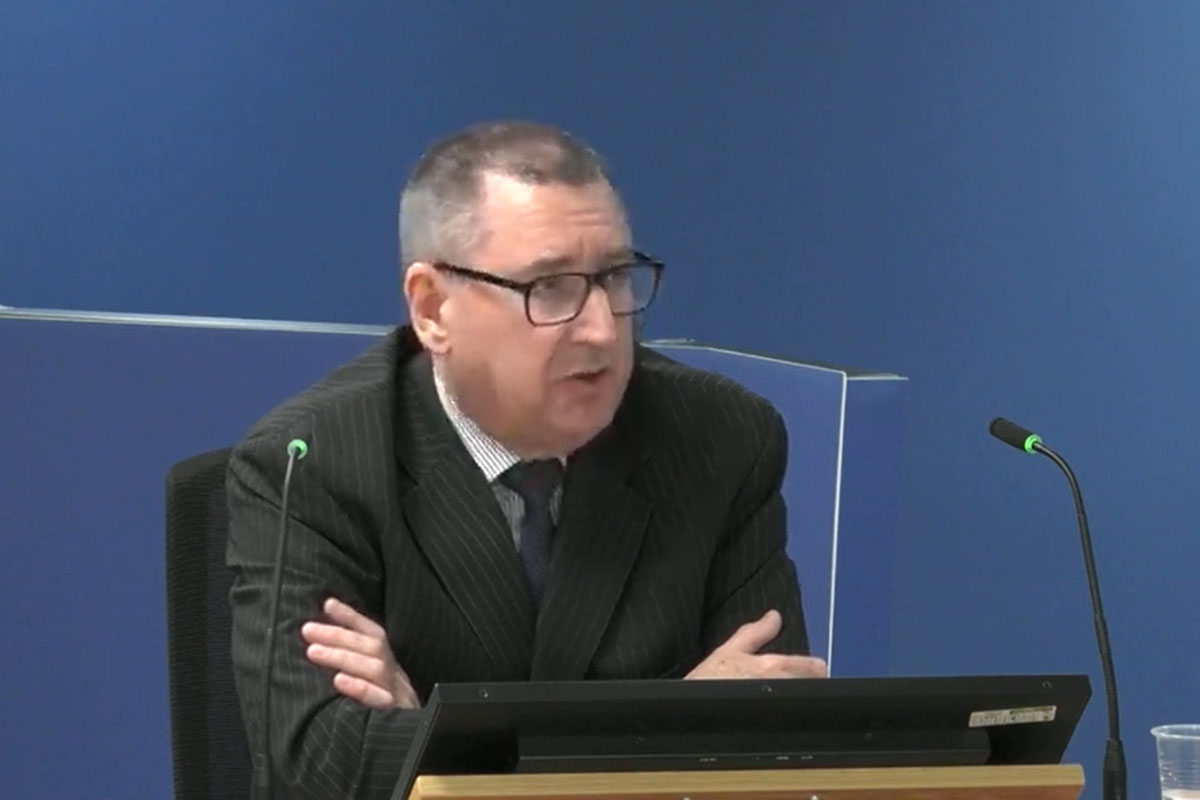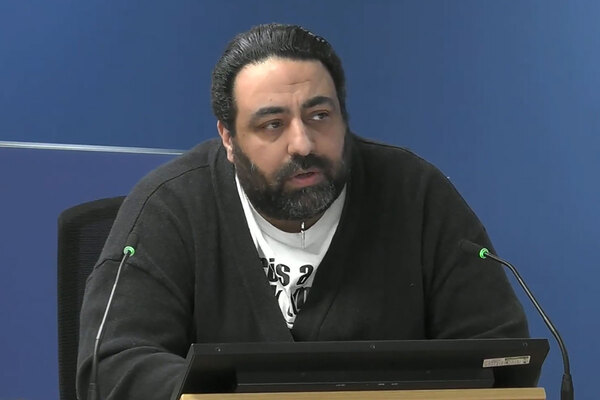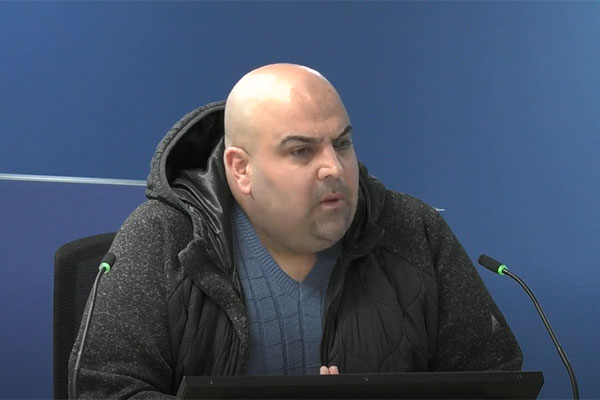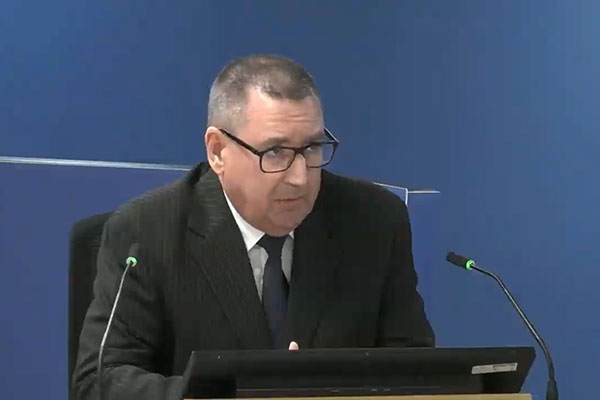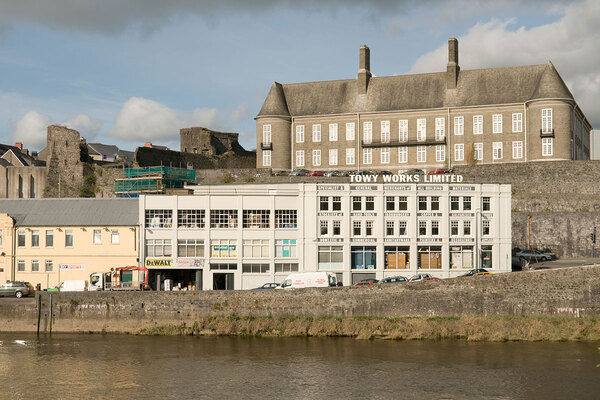You are viewing 1 of your 1 free articles
RBKC manager refused help from nearby borough despite telling colleagues Grenfell disaster was ‘bigger than any authority could manage’
The head of emergency planning at the Royal Borough of Kensington and Chelsea told another borough the council “had a handle” on the Grenfell Tower fire despite previously telling his boss it was “bigger than any local authority in London can manage”, the inquiry heard today.
David Kerry declined an offer of help from the City of London Corporation, a neighbouring authority, shortly after a meeting with Nicholas Holgate, the chief executive of RBKC at the time, in which Mr Kerry advised that RBKC needed mutual aid to deal with the situation.
Previously, the inquiry heard Mr Holgate had told colleagues that asking for mutual aid would look like “we can’t cope”. Mr Kerry accepted that this may have led to him declining the offer from the City of London.
The details emerged as Mr Kerry, emergency planning manager at the council between 2015 and 2019, gave his second day of evidence to the inquiry.
Yesterday, he recounted an “unpretty picture” in the lead-up to the fire, which included descriptions of emergency staff shortages, inadequate training, failure to record information about vulnerable people, a lack of a humanitarian response lead and being “ill-prepared” to deal with the disaster.
Today focused on the council’s response on the night of the fire and in the aftermath.
The inquiry previously heard evidence of chaotic scenes, lack of official staff on the ground, and survivors and the bereaved desperately searching for information, but in some instances being treated like “criminals” and refused entry to rest centres, which were “overwhelmed”.
Today the inquiry heard that it was at a meeting at 10am between council officers, managers and the chief executive that Mr Kerry told colleagues the the council needed help. However, at this point Mr Holgate advised that no mutual aid should be asked for.
In his emergency log, Mr Kerry said: “This incident is bigger than any one local authority in London can manage and consideration should be given to asking for mutual aid for the BECC [borough emergency control centre].”
Richard Millett QC, the lead counsel to the inquiry, asked: “What led you to form that view and to give that advice at that stage?”
Mr Kerry answered: “The clear understanding that we didn’t have sufficient BECC staff to maintain three BECCs 24/7 for what was going to be an extended period and that there would be a need to use mutual aid.”
He said he believed that none of the 33 boroughs could have dealt with the situation on their own.
“What was clear to me at that particular point was, ‘This is massive and it’s appalling and we don’t have the resources to deal with this.’
“Nobody would have had and that is exactly why we had mutual aid arrangements in London...”
Asked if he formed the impression that Mr Holgate was “reluctant” to seek mutual aid, Mr Kerry said he could not remember.
Reading what Stuart Priestley, Mr Kerry’s colleague who was also at the meeting, recounted, Mr Millett said: “David advised Nicholas of the mutual aid arrangements … Nicholas stated that looks like we can’t cope. The conversation on mutual aid at that point ceased.”
Mr Kerry said he couldn’t remember the conversation.
“Can you think of any justifiable reason at the time or any advantage for RBKC in not seeking mutual aid?” Mr Millett asked.
“No,” Mr Kerry said. “It was an absolute given in my mind that we were at the point where this is a massive disaster and we need mutual aid and that’s what the mutual aid arrangements are for.”
The inquiry was shown an email from Gary Locker, head of resilience at the City of London Corporation, sent at 10.35am the morning of the fire. Though not sent to Mr Kerry, Mr Locker referred to a conversation with him.
Mr Locker wrote: “Spoken to David Kerry, who has clearly been very busy. In his words, they have a handle on it, and at this stage do not require any further assistance.”
He added later: “David has my direct number and as he goes away now to get some sleep I’ve made an offer of our crisis support if he requires at a later stage – currently thankful for the offer but decline ...”
Mr Kerry said he could not remember the conversation, but accepted that it took place.
Mr Millett asked why he would say RBKC “had a handle on it” and did not need help after what he had said to Mr Holgate.
“I can only assume that I was reflecting the decision of the chief executive at that particular point that we were, as an authority, dealing with it,” Mr Kerry said.
The issue of his memory came up frequently throughout his two days of evidence, during which he said he could recall very little of the events due to being “exhausted” and running on little sleep.
Mr Kerry received a call after 2am about the fire and began coordinating the response. He went home after the 10am meeting, tried to sleep but mostly failed, then worked two night shifts as ‘council silver’, the person responsible for ensuring the strategic plan of the council is implemented in an emergency.
Mr Millett grilled him about his activity during the night shifts. Mr Kerry said in his statement that he had a “watching brief overnight”, in case a decision needed to be made by senior management, and did not “dynamically organise anything”.
Referring to what the BECC’s operational manual said under ‘tactical silver commander’, Mr Millett said: “It says, ‘Develop a tactical plan for how resources are to be obtained and used in order to achieve the strategic intentions of gold [the gold group covers strategy, usually the chief executive of a local authority]. Review and amend the tactical plan if necessary as the incident progresses.’
“So was it not your role as council silver to develop a tactical plan?”
“All of these plans of any nature, they are there to give the best guidance in the cold light of day that you can to meet any requirements.
“All of them get adapted to any other circumstances you find yourself in at the time,” Mr Kerry said.
He added that a local authority is not a 24/7 staffed organisation like emergency services.
The inquiry also heard that RBKC staff were not deployed to rest centres until about 10am, despite British Red Cross (BRC) staff repeatedly asking for help.
“It looks from this [BRC log] at least that, from 5.30am as I’ve just shown you, the British Red Cross made a number of requests to the council spanning some five hours for updates about when RBKC staff would attend the rest centres to provide support,” Mr Millett said.
Mr Kerry accepted the log, but said he was not present after 10.20am.
Asked who the person responsible for receiving information and acting on it was, who was continuously in the BECC, he said he did not know if it was an individual person.
He said he would assume that any BECC staff sitting at their terminals would have received calls and would have given the information to any others in the room involved in operations.
The inquiry also heard that a British Red Cross volunteer in the Westway Centre, which would eventually become the main rest centre, found a box full of paper with registered details of evacuees lying around. This was despite having handed them over to RBKC to collate the data.
Colin Brown, a British Red Cross staff member, said: “It appeared that no efforts had been made by the RBKC to collate the data in any sensible manner.
“I asked the bronze on-site duty officer to report the presence of this box to the RBKC to express concern and dissatisfaction as to this state of affairs and to ask for clarification as to how the data was being appropriately collated.
“However, I’m unaware of how the council responded or whether it did in fact do so at all.”
Mr Kerry said he had not heard that before and was “horrified”. He added that he could not account for it.
Asked at the end of his evidence whether he would have done anything differently, he said, “Yes. I could sit here and probably list an awful lot of stuff.... I should have said this to somebody at some point, I should have been more demonstrative.
“The authority has responsibility, not me solely, and I’m painfully aware of some of my failings.
“There are things I would do differently. I can’t sit here and list them all, but I’d like to hope that during the course of yesterday, certainly, and at some point today, I have given you acknowledgement of errors. I have given you acknowledgment of where, had I had the authority, individually or together, made other decisions that might have been a better response.
“I repeat my regrets and my apologies to the people of Grenfell, for those areas where we ought to have done better.
“We could have done better on training, we could have done better recruiting staff. Part of that responsibility is to the authority.
“Part of me – I wish I had made more of a noise at times, rather than just being the dutiful local authority manager. I am sorry.”
The inquiry continues.
Sign up for our weekly Grenfell Inquiry newsletter
Each week we send out a newsletter rounding up the key news from the Grenfell Inquiry, along with the headlines from the week
Already have an account? Click here to manage your newsletters
